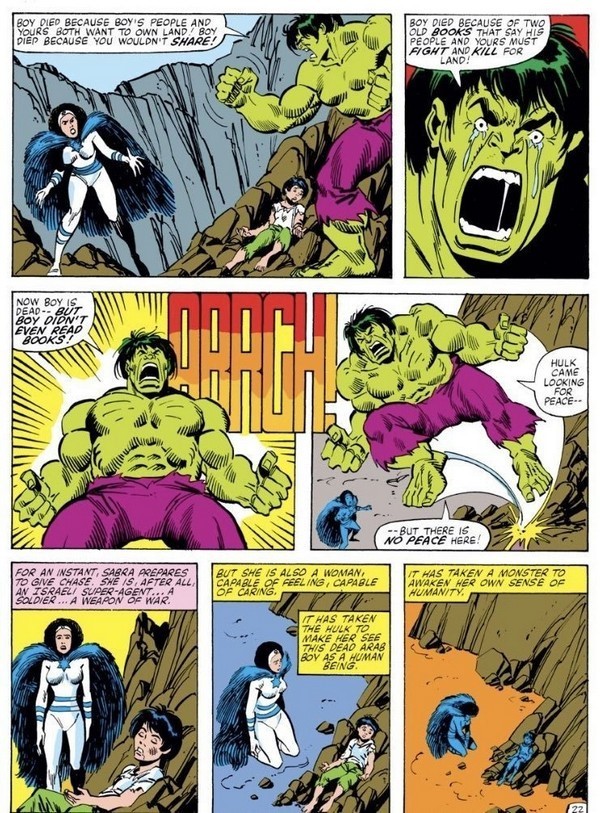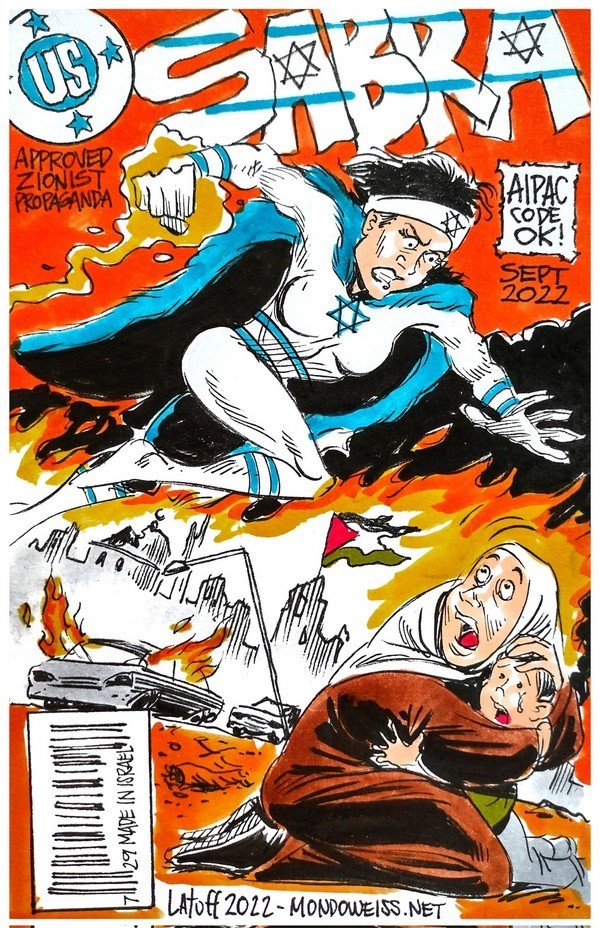OCCUPIED
JERUSALEM — It
was the latest addition to a fantasy world populated by an ever-growing cast of
superheroes and villains: Marvel Studios announced this past week that it had
cast Israeli actress Shira Haas to play Sabra, a mutant Israeli police
officer-turned-Mossad agent, in the next installment of the “Captain America”
franchise.
اضافة اعلان
While Jewish Israelis rejoiced at the casting
of an actress from Israel as a superhero in a major Hollywood production, the
backlash among Palestinians and their supporters was swift, and
#CaptainApartheid soon appeared on social media.
Many critics expressed outrage about Sabra’s
character and her identity as an Israeli intelligence agent, accusing Marvel of
buying into Zionist propaganda; of ignoring, or supporting, Israel’s occupation
of territory captured in 1967; and of dehumanizing Palestinians.
“By glorifying the Israeli army & police,
Marvel is promoting Israel’s violence against Palestinians & enabling the
continued oppression of millions of Palestinians living under Israel’s
authoritarian military rule,” wrote the Institute for Middle East
Understanding, a US-based pro-Palestinian organization, on Twitter.
Compounding the anger was the name of the
superhero, Sabra, which has different connotations for Israelis and
Palestinians. Sabra is the name of a refugee camp in Lebanon where a Christian
militia massacred between 2,000 and 3,500 people, according to Al Jazeera,
while Israeli troops stood by 40 years ago.
 Snippets from the Marvel comics featuring Sabra, a mutant Israeli police officer-turned-Mossad agent. “This is how Arabs are presented in Sabra’s first appearance in Marvel comics. The word Palestinian is never used. An Arab child in the comic who is an illiterate liar and thief is killed by black veiled bombers so Sabra can cry over them. Literally shoot and cry propaganda,” Twitter user @kkhelil said.
Snippets from the Marvel comics featuring Sabra, a mutant Israeli police officer-turned-Mossad agent. “This is how Arabs are presented in Sabra’s first appearance in Marvel comics. The word Palestinian is never used. An Arab child in the comic who is an illiterate liar and thief is killed by black veiled bombers so Sabra can cry over them. Literally shoot and cry propaganda,” Twitter user @kkhelil said.
According to Al Jazeera, the UN General
Assembly passed a resolution declaring the massacre an “act of genocide”, and
in February 1983, the UN commission found that “Israeli authorities or forces
were involved, directly or indirectly in the (Sabra and Shatila) massacres”.
But, to Israeli Jews, a Sabra can simply be a
person born in Israel.
“The bottom line is that to Palestinians,
Marvel having an Israeli superhero whitewashes the occupation,” said Sani Meo,
publisher of This Week in Palestine, a magazine about Palestinian issues.
Palestinians and their supporters around the
world have been posting profusely about “Captain Apartheid,” he said. “Some of
it is humorous,” he added, “though the topic is not humorous”.
Marvel Studios declined to answer detailed
questions about the issue or about the company’s intentions in bringing Sabra
to the big screen.
“While our characters and stories are
inspired by the comics,” the studio said in a statement, “they are always
freshly imagined for the screen and today’s audience, and the filmmakers are
taking a new approach with the character Sabra who was first introduced in the
comics over 40 years ago.”
Whatever its motivations, Marvel has found
itself being condemned by pro-Palestinian advocates.
Israel has been criticized by international
human rights groups and by boycott and divestment activists for its policies
toward the Palestinians. Some of those organizations equate Israeli policy with
apartheid. Currently, About 475,000 Israeli settlers live in the West Bank in
settlements that are illegal under international law.
But Israel is also gaining broader acceptance
by some Arab governments, such as the UAE.
Much of the outcry over Marvel’s decision to
include Sabra in the new movie, called “Captain America: A New World Order,”
centers on the name of the character itself.
 cartoon by Carlos Latuff. Twitter user @ jimzawiya said in a recent tweet: “Marvel announcing Sabra as a new character when she’s a Mossad and isr**l (Israel) propaganda character just one week before the 40th commemoration of the Sabra and Shatila massacre is just… sickening.”
cartoon by Carlos Latuff. Twitter user @ jimzawiya said in a recent tweet: “Marvel announcing Sabra as a new character when she’s a Mossad and isr**l (Israel) propaganda character just one week before the 40th commemoration of the Sabra and Shatila massacre is just… sickening.”
To Israeli Jews, sabra is the Hebrew name of
a cactus bush and its fruit, prickly on the outside and soft and sweet on the
inside, which the nation’s founders adopted as the nickname for native-born
Israelis.
But to Palestinians, the sabra bush,
traditionally used to mark the boundaries of village lands, is a symbol of loss
and steadfastness (“sabr” is also the Arabic word for “patience”). During the
war that accompanied Israel’s creation in 1948, Zionist Israeli forces
destroyed hundreds of Palestinian villages, and hundreds of thousands of
Palestinians became refugees after fleeing or being expelled from their homes.
But the hardy sabra bushes remained an indelible part of the landscape even
after most traces of the villages were erased.
Critics have also accused Marvel of being
insensitive to the link between the Israeli superhero’s name and that of the
refugee camp in Lebanon. Sabra and Shatila are the names of two Palestinian
camps in Lebanon where, from September 16 to September 18 in 1982, a Lebanese
Christian militia massacred hundreds of residents. Israeli troops had allowed
the militia to enter the camps, and Israeli commanders issued no orders to stop
the carnage.
“Social media activists are slamming Marvel
over their new Israeli Mossad superhero ‘Sabra,’ whose name is sensitive
considering the Sabra and Shatila massacre,” the official Palestinian news
agency WAFA wrote on Twitter.
The character of Sabra first surfaced in an
issue of “The Incredible Hulk” comic book in 1980, wearing a blue cape and
white bodysuit featuring a Star of David. That debut was some two years before
the massacre in Lebanon.
Critics pointed at how in a 1981 Hulk issue
titled “Power and Peril in the Promised Land,” the character of Sabra initially
showed little emotion over the death of a Palestinian boy in an explosion,
until the Hulk enlightened her about basic human values.
Nothing is yet known about the story line of
the next “Captain America” movie, which is scheduled for release in 2024, or
the scope of Sabra’s debut role.
Read more Trending
Jordan News








